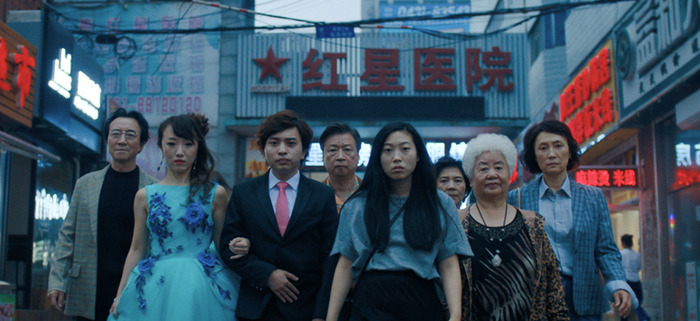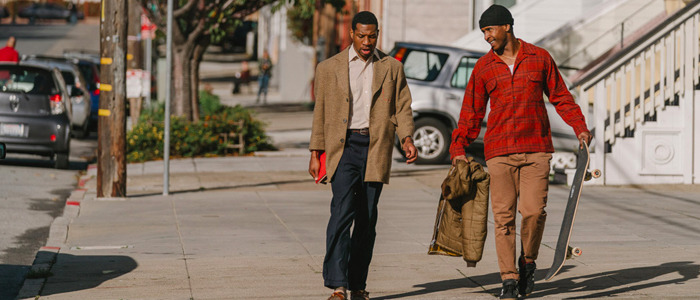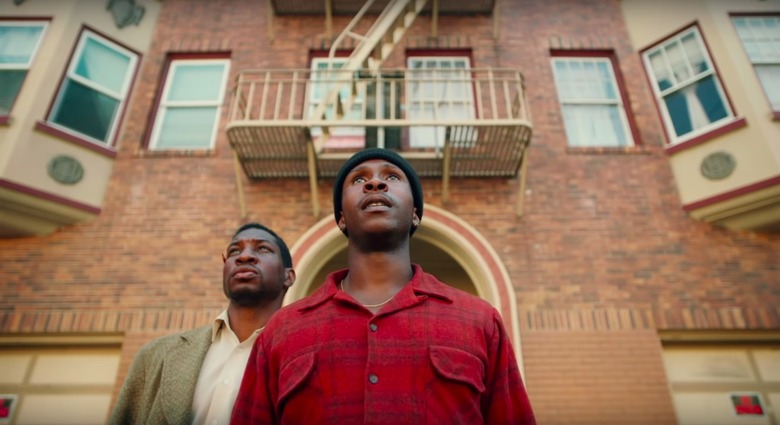White Lies And Dark Truths: How 'The Farewell' And 'The Last Black Man In San Francisco' Explore Gentrification Onscreen
It's not a comparison most would make, is it? After all, what could two movies that are seemingly as vehemently opposed as The Farewell and The Last Black Man in San Francisco possibly have in common? One is a story about a Chinese American woman dealing with her grandmother's illness, and the other is an account of a young African American man attempting to reclaim a childhood home he can no longer afford.As strange a pairing as these two A24 releases may seem at first glance, there's a lot more shared idiosyncrasies than what meets the casual observer eye. At their core, both of these films are fish-out-of-water narratives in which white lies serve as the antidote to the terminal loss of home.
Based on an Actual Lie
Lulu Wang's The Farewell begins with the words 'Based on an actual lie'. A statement that draws scattered laughter from the crowd also serves as the basis for the plot, as untruths litter the world which Wang has built in the name of comforting people we love. When Billi (Awkwafina) learns that her Nai Nai (Shuzhen Zhao) has been diagnosed with lung cancer and has three months left to live, the news is only revealed to her after she insists on learning why her father Haiyan (Tzi Ma) is so upset. In China, when a medical diagnosis is given, the doctors tell the family members the result instead of the patient at hand. When Nai Nai's sister Little Nai Nai (Lu Hong) learns of her sibling's affliction, she and Billi's parents decide not to tell her, and instead throw an elaborate family reunion in the guise of a shotgun wedding between Billi's cousin Haohao (Han Chen) and his girlfriend of three months Aiko (Aoi Mizuhara). Haiyan and Jian (Diana Lin) advise their westernized daughter not to come with them back to Changchun, because she is too American now and her emotional transparency will inevitably cause her family to give up the ghost. However, as made evidently clear by the opening scene on the telephone, Billi and her Nai Nai share an unbreakable bond, and with the added push of career troubles in Billi's corner, her sentiment to leave New York City and travel back to her hometown to visit her grandmother is too necessary a notion to squander on fears of a poor poker face.Once Billi surprises her family in China with her big arrival, she struggles to go along with her parents' façade, constantly questioning their moral stance in a way that flips the typical East meets West trope on its head. The English speaking doctor the family visits during a 'routine' checkup for Nai Nai calls what they're doing "a good lie", and explains to Billi that most families in China would do the same. Whereas individualism is the norm in the West, in the East, collectivism is the guiding light for many. A person doesn't belong to his or her self, they are but one part of a familial whole, a community, and it is therefore Billi's family's responsibility to bear the emotional weight of their Nai Nai's truth. It's a tough world to navigate for Billi, who comes to feel like a foreigner in her own hometown. The traditionalism she rebels against also feels like the romanticized past she's yearned for during her time in the States. Billi's grief manifests as a result of her loss of home, both figuratively, as her grandmother embodies her familiar shelter from the storm, and literally, as gentrification in China bulldozes away the beautiful neighborhood she once knew.
A City That Doesn't Love You Back
Director Joe Talbot wrestles with similar inner turmoil in The Last Black Man in San Francisco, a movie starring his best friend Jimmie Fails in a heightened tale about their lives that explores their shared love and lamentation for the city that doesn't always love them back. In the film, Fails, who plays himself, spends every waking moment with his quirky bud Montgomery Allen (Jonathan Majors). Together, the two coast dreamily down through the Tenderloin to the Fillmore via Jimmie's skateboard. The pair skate breezily past sun-speckled ships and wavy canals, hugging curves, shadows dancing across lush golden hills, proving themselves infinite, if only for a fleeting moment. The two are usually headed back to Hunter's Point neighborhood, on their way to visit the majestic Victorian Jimmie's grandfather built in the 1940s. Despite the fact that a rich white couple now inhabit the home Jimmie grew up in, he spends most of his spare time there, much to their dismay, sprucing up the old place. A fresh coat of paint, a cracked window that needs fixing – Jimmie typically takes care of the problem before the new homeowners are even made aware of its existence. When the day comes that the current tenants temporarily lose the house in a legal battle, Jimmie and best friend Mont surreptitiously move everything in that Jimmie still owns, staking a claim on what Jimmie believes to be rightfully his. However, this street doesn't look quite like he remembers. The house that capitalism claimed now comes at a very high price, and its one that only a certain socioeconomic class can occupy. It's not long before the wood paneled walls of Jimmie's childhood home begin to close in on him, as his hopes and dreams of maintaining a romance with the only place he has left to call home vanish as quickly as the African American population of current day San Francisco.
A Shifting Community
There's something in the water in the Bay Area, and it's not just radioactive aquatic creatures. A slew of visionary filmmakers all happen to be cranking out essential stories about gentrification in San Francisco right around the same time, albeit through very different methods of storytelling. 2018 saw the release of two movies set in the Bay Area, director Carlos López Estrada's Blindspotting and director Boots Riley's Sorry To Bother You. Estrada recounts Daveed Diggs and Rafael Casal's real life experiences while growing up in a quickly changing town, and Riley dreams up a nightmare in which telemarketers sell slavery, but both deal with the disappearing middle class of the San Francisco area, and the code-switching that results when everyday people are caught between two cultures. In 2008 Barry Jenkins made his directorial debut with Medicine for Melancholy, a movie starring Wyatt Cenac and Tracey Heggins as a young possibly soon-to-be couple going through the motions of the day after a one night stand in San Francisco. 2019 saw the release of first time director Nahnatchka Khan's Always Be My Maybe, a film starring possibly soon-to-be couple Sasha Tran (Ali Wong) and Marcus Kim (Randall Park) dealing with an unexpected reunion in the Bay Area after one unceremoniously life changing moment in the back of Marcus' car many moons ago. Both films deal with the awkwardness of romance while also simultaneously examining the challenging path to finding one's identity as a minority in a rapidly gentrifying city that no longer feels like the fabric of home.The Farewell's Billi is no stranger to gentrification. China is always changing, trading the old for the shiny and new. In Hong Kong, the government is trading out dai pai dongs for chic and trendy night clubs, putting countless business owners out of work all in the name of cleaning up the streets. In director Wang's hometown of Beijing, Chinese leader Xi Jinping demolished migrant villages as part of a housing crackdown following a deadly fire, which some believe is being used as a catalyst to launch low-end workers out of the city. This is all done in the name of a 'China Dream', a political slogan served to soften the attack on the poor. Currently, Xi Jinping seeks to stretch his grip on the control of the Chinese public even more, as he fights to undercut human rights with new extraction laws from Hong Kong to mainland China.Just as Billi and her family lie to Nai Nai about her medical condition in The Farewell, so, too, does Jimmie lie to himself and others about the origin of his house in The Last Black Man in San Francisco. It's not that he means to spread falsehoods, it's just that as a person responding to his environment, he feels that he and the natives who helped mold the city deserve to stay in the place they wish to call home. It's not something that should just be reserved for transplants and millionaires. Jimmie's parents aren't really in the picture anymore, and the charming house, with its witch hat and its brightly lit hallways, offered a lost young man a sense of refuge in a chaotic world. Like a pseudo parent, the house provides Jimmie with the nurture he never received as a child. Just as Billi's losing of her grandmother coincides with the loss of her childhood home in Changchun, so, too, does Jimmie grapple with the forfeiture of his most cherished characters in San Francisco.Despite the fact that the African American population of San Francisco had a large hand in making the city what it is today, black men now only make up about 5% of the populace. Despite these numbers, around half of all law enforcement is directed at African Americans in the Bay Area. Around the same time that Talbot and Fails were hard at work on their movie, San Francisco had to pay Jamal Trulove $13.1 million for being framed by the police for murder. Trulove served more than six years in prison for a crime he did not commit. The artist was pursuing a career in acting and hip-hop at the time of his arrest, and he appears in Talbot's The Last Black Man in San Francisco alongside Fails and Majors.Also appearing in The Last Black Man in San Francisco is powerhouse performer Danny Glover in the role of Montgomery's blind grandfather, Grandpa Allen. Glover is a real life San Francisco native who pops up not only in Talbot's tale of gentrification of the city, but also in Boots Riley's Bay Area set warped reality Sorry To Bother You as a fellow telemarketer next to Cassius Green (LaKeith Stanfield) who advises the newcomer to use his "white voice" to survive. Glover stands as a monument to the history of the town, a crucial component of the identity of the culture that serves to be as distinct and recognizable as the golden arches in the fog.In both The Farewell and The Last Black Man in San Francisco, the setting becomes a character that hopes to transcend the past. These tragicomic deep dives on home, family and community show that there is universality in specificity. Each story has its own setting, and each filmmaker explores that setting through various rose tinted lenses and unique love languages, but both are ultimately about empathy. Neither film necessarily passes judgment on its circumstances – is it morally sound to lie to an elderly woman about her chances? Should those who participate in the furthering of gentrification be punished the erasure of the marginalized groups? – that's for the audience to decide. These are simply beautiful examples of film as cultural barometers telling stories about home, an attempt to ask viewers to understand, and perhaps even dignify the minorities that fill so many lives with such gorgeous fables about worlds which might happen to be different than our own.



